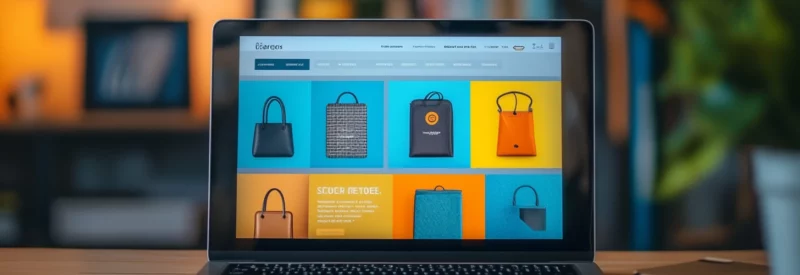Choosing the right eCommerce platform is essential for entrepreneurs with a digital marketplace. You probably already know of Shopify, an online retail giant, but some newer innovative platforms like Pietra and many others are worthy competitors. Whether you’re a seasoned business owner looking to switch platforms or making your first foray into online sales, this guide will help you decide between Pietra and Shopify.
Pietra vs Shopify: Quick Overview

Pietra is an eCommerce platform designed to help creators launch and scale their eCommerce brands. It provides tools and services that enable entrepreneurs to find suppliers, create products, build an online storefront, and manage tasks like inventory and shipping.
The platform aims to serve as a one-stop shop for creating and selling products online without managing the complexities of manufacturing and distribution. With its network of suppliers and a suite of tools to handle logistical and operational challenges, Pietra makes running an eCommerce business easy for beginners and established brands.
Shopify, one of the most well-known and widely used eCommerce platforms globally, strives for comprehensive functionality. The platform is favored for its ease of use, flexibility, and scalability, allowing you to grow your business over time and extend the functionality of your shop with numerous apps.
Shopify supports a range of sales channels, including brick-and-mortar locations. This makes it a great option for selling both online and in person.
Pietra Pros
- Built-in dropshipping feature
- Complete fulfillment solution, including storage and shipping management
- Integrates with existing stores
- Workshops and dedicated assistance for newcomers
- Multichannel sales
- Vast supplier network
- Customizable subscription plans with only the features you need
Pietra Cons
- The primary focus on a dropshipping model might not suit all businesses
- Limited data analytics
- Determining the right price point for your products can be challenging
Shopify Pros
- User-friendly
- All plans include hosting, security updates, and SSL certificates
- Sell products online or in physical locations with Shopify POS
- Multichannel sales
- Extensive app store
- Robust inventory management
- 24/7 support
Shopify Cons
- High transaction fees, especially when using third-party providers
- Limited blogging features
Pietra vs Shopify: A Detailed Look
When deciding between Pietra and Shopify, understand your business needs and growth plans. This will help you choose the best option for your long-term strategy and avoid switching platforms later on. Along with monthly fees, you need to weigh which features are included and any additional costs, like transaction fees, third-party add-ons, extra marketing fees and tools, POS hardware, and other services.

Shopify vs. Pietra Pricing
Pietra Plans and Pricing
Pietra offers both set plans and customizable options. The membership model is flexible because you can pay monthly, quarterly, or annually. However, pricing differs depending on your payment term. Annual subscriptions provide the best discount. All three plans include product design tools, storefront, and print-on-demand features.
Beginner
- $20–$39 per month, depending on your payment term
- Maximum 500 monthly shipping orders
- Low warehouse and fulfillment rates ($1.50/order fulfillment)
- Connection with three additional sales channels to sell your products
- Business guides to successfully launch your brand
- Work with up to 10 suppliers from the sourcing marketplace
Scaling
- $50–$89 per month, depending on your payment term
- Maximum 2000 monthly shipping orders
- Low warehouse and fulfillment rates ($1.25/order fulfillment)
- Connection with up to seven additional sales channels to sell your products
- Business guides to successfully launch your brand
- Work with up to 25 suppliers from the sourcing marketplace
- Email, SMS, and influencer marketing features
- Analytics
Professional
- $100–$199 per month, depending on your payment term
- Unlimited monthly shipping orders
- Warehouse and fulfillment rates are only $1.25 per order fulfillment
- Connection with unlimited sales channels and suppliers
- Email, SMS, and Influencer marketing features
- Analytics
- One-on-one guiding sessions with a Pietra specialist
- Priority support
In addition to Pietra’s three main plans, you can assemble a custom plan with only the necessary tools, such as product design tools, storage and order fulfillment, an eCommerce storefront, or a print-on-demand shop.
Shopify Plans and Pricing

While Shopify and Pietra offer similar tools, each platform’s focus differs. Shopify does not include product design tools and dropshipping in its primary plans, but you can add these features later. Instead, it focuses on providing a highly customizable, user-friendly platform to build your brand and online store.
Shopify offers various pricing plans to accommodate different business requirements. Start-ups can select a budget-friendly option and scale up as they grow. You can pay monthly or annually for your subscription. Opting for an annual payment grants a 25% savings over the monthly option. Note, however, that exact pricing may also vary by your business’s geographic location.
All plans include free hosting, an SSL certificate, customizable templates, unlimited product listings, analytics features, helpful customer segmentation, and abandoned cart recovery tools. In addition to your subscription fee, you will need to purchase your own domain name. You may also incur additional fees for paid themes and app integrations as you select them.
Basic Plan
- $19–$25 per month
- 10 inventory locations
- Two staff access accounts
- Basic sales reports
Shopify Plan
- $49–$65 per month
- Five staff access accounts
- Professional sales reports
Advanced Plan
- $299–$399 per month
- 15 staff access accounts
- Custom report builder
- Third-party calculated shipping rates
Finally, Shopify Plus is the company’s enterprise-level option. This comprehensive solution starts at $2,300 monthly on a three-year term and customizes transaction fees based on sales volumes. In addition to the above features, Plus includes priority support, omnichannel commerce, and B2B eCommerce functions.

Payment Gateway and Fees
While Pietra enables you to build your own eCommerce store, it also lets you integrate with existing stores on platforms like Shopify, WooCommerce, and Wix. When using these platforms, you will automatically integrate with the payment gateway of the given platform. This means transaction and payment processing fees will vary according to your service provider.
On its own platform, Pietra integrates with Stripe. However, its website does not provide information on transaction and processing fees. You will have to contact Pietra’s support team for information regarding customer payments.
Meanwhile, Shopify supports integration with a wide range of payment gateways, though it prioritizes its own in-house payment processor, Shopify Payments. Shopify Payments accepts all major debit and credit cards, Google Pay, and Apple Pay.
Shopify Payments fees differ according to your subscription plan. The Basic Plan sets online transaction fees at 2.9% + $0.30, while in-person fees are 2.7%. With the Shopify Plan, this lowers to 2.6% + $0.30 for online transactions and 2.5% in person; the Advanced Plan follows at 2.4% + $0.30 for online transactions and 2.4% for in-person sales, accordingly.
If you choose to use a payment gateway other than Shopify Payments, the platform charges an additional 0.6%–2% processing fee per sale. This fee exceeds the transaction fee charged by your chosen payment provider. Note that if you are in a country that does not support Shopify Payments, you must use a third-party processor—and pay accordingly.

Sales Tools and Features
Pietra and Shopify provide user-friendly interfaces with streamlined checkouts, ensuring a smooth shopping experience for customers. They allow you to organize and showcase your products in a visually appealing online catalog and provide sales analytics for insightful performance data.
Pietra provides a Sales Network that lets you simultaneously list your products on various wholesale, retail, and direct-to-consumer (DTC) platforms such as eBay, Etsy, and Facebook Marketplace to boost your sales. The platform handles order fulfillment for any sales made through this network. As the brand owner, you receive payment (minus any applicable fees). Consolidating multiple sales channels avoids having to manage multiple accounts individually.
Shopify also allows you to sell on multiple channels, though it does not consolidate the information the same way. Some other standout features include automated abandoned cart recovery reminders, cross-selling and upselling tools, and customer accounts. You can also create promotions and discounts to attract customers and encourage sales.

Inventory Management
Pietra features a straightforward interface that simplifies inventory management. You can quickly categorize and order products, streamlining inventory oversight, tracking, and retrieval. Users can also set stock level alerts to receive timely notifications when levels are low. With multi-location support, companies with several storage facilities can accurately monitor inventory. Pietra’s inventory analytics also provide valuable sales trends and flow data.
Shopify’s inventory tracking feature allows for real-time monitoring of product availability and variant management of product sizes and colors. As with Pietra, you can set stock alerts to receive notifications when it’s time to restock. The platform’s order management system automatically updates inventory levels across sales channels, allowing users to manage stock in a single hub, whether sales occur online or in person.

Design and Themes
The design of your eCommerce store is critical to success, as it can directly influence customers’ perception of your brand and their shopping experience.
Pietra and Shopify both focus on attractive and intuitive store designs for customers. Themes are designed for eCommerce efficiency, with features that showcase products and facilitate easy browsing. They provide a range of customizable templates, allowing you to tailor your online look to reflect your brand identity.
Both platforms’ design tools are fairly straightforward, enabling people without design skills and coding knowledge to use them. Furthermore, both ensure online stores are mobile-friendly, adapting smoothly to different screen sizes for a streamlined shopping experience on mobile devices.
Shopify also offers a mobile app that allows you to handle operations like order processing and inventory tracking on the go. Plus, its mobile-friendly design meets Google’s standards, enhancing your store’s search engine ranking on mobile devices.
For those familiar with web development, Shopify allows access to the store’s HTML and CSS for more detailed and unique customization.

Marketing and SEO Tools
Even the most functional and beautiful eCommerce store won’t attract customers without proper marketing. Pietra and Shopify offer tools like email marketing, social media integration, and SEO capabilities.
If the plan you choose with Pietra does not have email campaign functionality, you can add it on for a monthly fee. Meanwhile, Shopify’s built-in email marketing tool provides a range of customizable email templates, lets you upload images, and includes an option for an express checkout button in the email. Additionally, the Shopify Magic feature can automatically generate effective email subject lines on the fly.
Both platforms provide built-in features for eCommerce SEO. In addition to meta-descriptions and automatic site optimization for mobile, you can write keyword-driven titles, add image Alt tags, and customize page URLs. Pietra, however, falls behind slightly when it comes to the SEO options available on Shopify.
Since both are eCommerce-first platforms instead of blogging platforms, neither particularly prioritizes robust blog features. You can boost SEO with basic blog content and create engaging and visually appealing pages to attract and inform customers. For many eCommerce stores, these blog features are sufficient. However, if blogging is the core of your business, we recommend adding a specialized third-party app to maximize SEO benefits.

Apps and Integrations
Speaking of apps, Shopify’s App Store is one of the most extensive of any eCommerce platform. It offers over 8,000 apps, targeting functions as varied as sales, shipment processing, marketing, analytics, dropshipping, accounting, and customer communication. This allows you to add almost any functionality to your website. While Pietra also offers third-party integrations, they largely focus on sourcing, manufacturing, shipping, and logistics.

Customer Support
Both platforms provide a help center with articles and tutorials, enabling users to resolve common issues independently. Pietra offers support mainly through email and a ticketing system, while Shopify offers 24/7 email and live chat support. Both platforms offer priority support for their top-tier plans.
Which Is Best for My Business Needs: Shopify or Pietra?
The better solution between Pietra and Shopify will depend on your business’s unique needs and the features you prioritize.

Small and Middle-Market Business
Shopify stands out for its accessibility, reliability, and scalability. While it’s quick and easy to set up a store without technical knowledge, it also offers comprehensive features catering to various business types and sizes. Since you can scale up as your business grows, Shopify is an excellent choice for small- to medium-sized businesses that are anticipating growth and require a platform that can adapt to their evolving needs.
Pietra, on the other hand, excels for businesses focused on product creation and brand development. It provides a streamlined approach to connecting with suppliers and fulfilling orders. The platform suits businesses focused on launching their own product lines without the complexities of manufacturing and logistics. Its ease of use and integrated services may appeal to entrepreneurs who prefer a more hands-off eCommerce operation.
You can also use Pietra to create your products and manage fulfillment while integrating with Shopify for robust eCommerce, sales, and marketing tools.

Corporations
Shopify Plus is the ideal platform for enterprise businesses, offering a robust suite of features designed for large-scale operations. It provides dependable infrastructure, substantial traffic management, advanced security, premium support, and broad integration options to meet the high demands of enterprise-level companies.
Although Pietra does offer an enterprise-level plan, it does not provide immediate information on what it provides. It also doesn’t clarify how well your store will handle increased traffic and what security features are provided.
For this reason, Pietra would most likely serve best as a complementary service integrated with Shopify Plus. It can expand the company product line with print-on-demand options without increasing inventory risks and overhead.
Pietra vs Shopify: Tailoring Your eCommerce Strategy
Both Shopify and Pietra offer compelling features for building an eCommerce business, each with unique strengths. Shopify shines with its comprehensive customization options, scalability, and many integrations catering to various businesses. While more niche, Pietra offers an excellent platform for creators and entrepreneurs focused on simplified product creation.
No matter what platform you use — Pietra, Shopify, or another option — you should consider your payment features. Convenient payment options are essential for an eCommerce business to thrive. Whether you’re selling on a large or small scale, locally or globally, picking the right payment processing solution can help boost sales and cut down on fees.
PaymentCloud’s payment processing solutions for large and small businesses are designed to reduce transaction fees. Our secure, fast, and PCI-compliant system integrates with platforms like Shopify, allowing customers to pay in a way that suits them best while ensuring a seamless shopping cart experience. We’re dedicated to creating a payment solution that meets your unique requirements and scales with your growth. Reach out to start crafting your eCommerce strategy!
Pietra vs Shopify FAQs
Which Is Better for Dropshipping?
While both platforms can accommodate dropshipping, Pietra is designed specifically for this. Therefore, it may be your preferred platform if you focus on a dropshipping model.
Which Platform Offers More Customization Options for eCommerce?
Shopify and Pietra enable you to create a personalized online store with various customization and branding choices. However, Shopify provides a more sophisticated store builder, while Pietra is geared toward helping creators establish their own merchandise shops.
On its higher-tier plan, Shopify allows access to the store’s HTML and CSS for more detailed and unique customization. If you have coding knowledge, Shopify can make an excellent choice for those needing highly customized features.
Can I Migrate My Current Shopify Store to Pietra?
Yes, you can transfer an existing Shopify store to Pietra. This process involves moving your data and rebuilding your website to fit Pietra’s platform, and it can be rather complex. You should always seek the assistance of professionals specializing in platform migration to ensure no critical data is lost and that the transition has minimal effect on your business operations.






